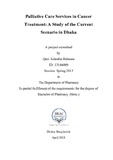| dc.contributor.advisor | Kabir, Eva Rahman | |
| dc.contributor.author | Rahman, Qazi Ashrafur | |
| dc.date.accessioned | 2018-12-03T08:40:25Z | |
| dc.date.available | 2018-12-03T08:40:25Z | |
| dc.date.copyright | 2018 | |
| dc.date.issued | 2018-04 | |
| dc.identifier.other | ID 13146009 | |
| dc.identifier.uri | http://hdl.handle.net/10361/10948 | |
| dc.description | This project report is submitted in partial fulfilment of the requirements for the degree of Bachelor of Pharmacy, 2018. | en_US |
| dc.description | Catalogued from PDF version of project report. | |
| dc.description | Includes bibliographical references (page 44-49). | |
| dc.description.abstract | Palliative care is explicitly acknowledged globally as an approach that falls under the human right to health. While there is a raised awareness of the vitality of palliative care for chronic diseases, this need is still unaddressed in several parts of the world. Furthermore, there is a fundamental difference between palliative care and hospice care and it is time to not only consider palliative care for those patients who have exhausted options for life-prolonging therapies. Therefore, to ensure the best care throughout the patient disease trajectory, there is urgency for the co-opting of palliative care with standard medical care for patients with serious illnesses. In Bangladesh, the concept of palliative care is still negligible and only a countable number of institutions and hospitals provide palliative care facilities whereas this important issue is being ignored by most of the institutions, hospitals and clinics in Bangladesh. Thus, the aim of this study is to investigate the current status of palliative care in Bangladesh and to highlight the importance of palliative care services offer to the patients. Furthermore, the primary objective of this study is to gain an understanding of the overall situation of palliative care in Bangladesh and the goal is to identify the scope of developing palliative care in Bangladesh. To develop the palliative care in Bangladesh, it is highly recommended to develop policy and guidelines for palliative care in the national level. Besides, it is also essential to upgrade national opioid control policy as well as upgrade and expend the palliative care education, training and certification program in harmony with the national guiding principle. | en_US |
| dc.description.statementofresponsibility | Qazi Ashrafur Rahman | |
| dc.format.extent | 49 pages | |
| dc.language.iso | en | en_US |
| dc.publisher | BRAC University | en_US |
| dc.rights | BRAC University project reports are protected by copyright. They may be viewed from this source for any purpose, but reproduction or distribution in any format is prohibited without written permission. | |
| dc.subject | Cancer treatment | en_US |
| dc.subject | Palliative care | en_US |
| dc.subject.lcsh | Cancer--Patients--Medical care. | |
| dc.title | Palliative care services in cancer treatment: a study of the current scenario in Dhaka | en_US |
| dc.type | Project report | en_US |
| dc.contributor.department | Department of Pharmacy, BRAC University | |
| dc.description.degree | B. Pharmacy | |

